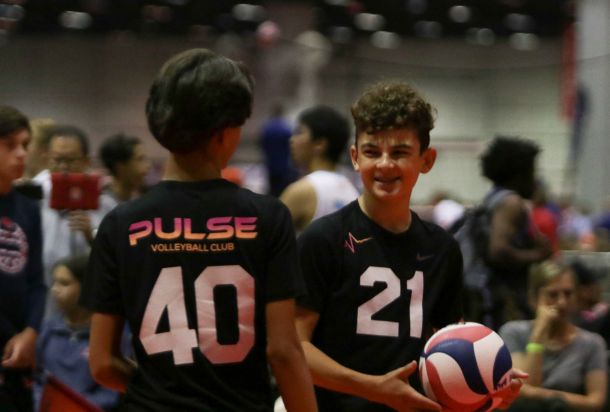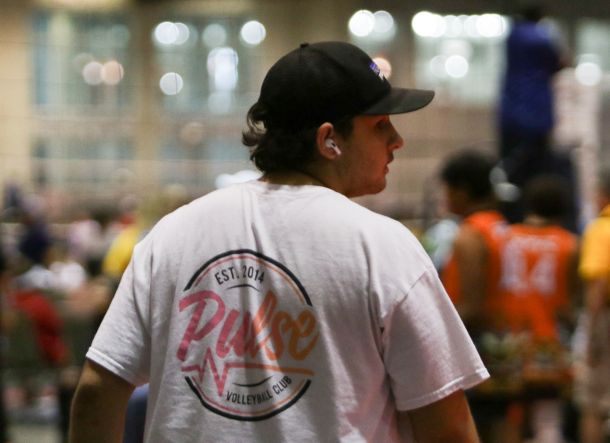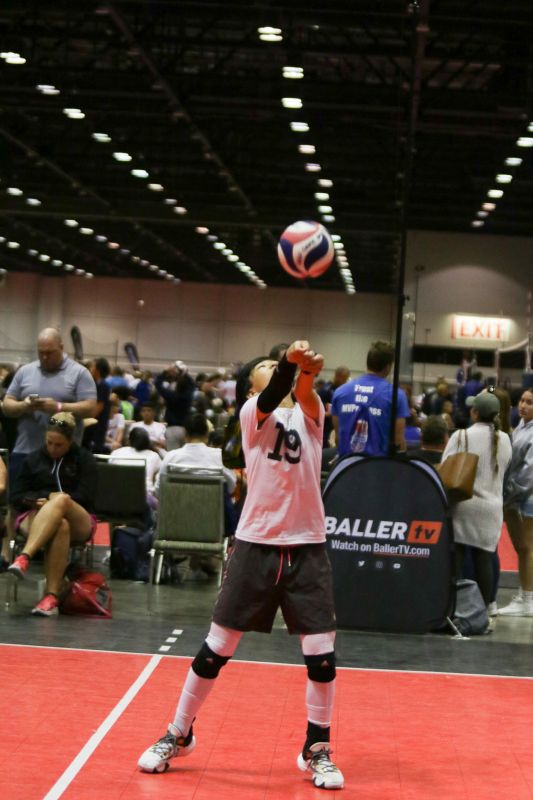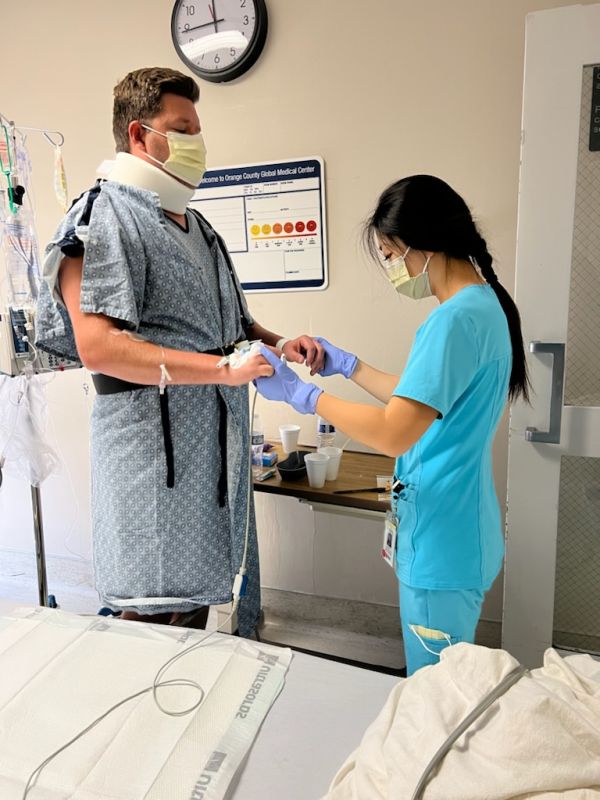Beyond the Court: The 'Hart' of the Club
07/09/2022
Coach Daniel Hart couldn't be at AAU's Junior National Volleyball Championships after suffering a stroke. But his Pulse Volleyball Club 14-1 team was still able to pull off an incredible performance.
By: Kelsey Burr
Orlando, Fla. – The Pulse Athletics Volleyball Club 14-1 team overcame incredible odds to finish in second place in the 14 Classic division of the 2022 AAU Boys’ Junior National Volleyball Championships. Not only did they shatter expectations after being the 14th seed, but they accomplished it all without their head coach on-site.
Daniel Hart, the head coach of the team and club director, was home in California, forced to cheer for his team from afar. That’s because around two months ago, he almost died from a stroke.
His perspective on life suddenly shifted following what was supposed to be a routine chiropractor visit. Except this time, when they cracked his neck, something didn’t feel right.
“I started to get a little dizzy, a little nauseous, and started vomiting, and so I ended up going to an emergency room,” Hart said.
Medical staff there took a CT scan, and then transported Hart to a Level One trauma hospital for further assessment and care. He was immediately given an MRI, but had to stay the night at the hospital as they awaited results.
“At this point, I still had no idea what was going on. No one had told me anything, but I figured it’s pretty serious,” Hart said. “The next morning, a doctor came in and said that I had a stroke. And I was like… what? I’m 34 years old, I’m fairly active, I don’t have a history of anything in relation to this. I hadn’t been educated at that time on what a stroke is, and what happens with it.”
According to the CDC, a stroke occurs when something blocks blood supply to part of the brain, or when a blood vessel in the brain bursts. In either case, parts of the brain become damaged or die. Strokes can cause lasting brain damage, long-term disability, or even death.
After an angiogram test to find out what was going on, Hart was diagnosed with a right vertebral artery dissection and small acute stroke. His right vertebral artery, which connects to the brain, dissected, or was cut, when his neck was manipulated at the chiropractor.
“When the artery dissected, it created a stoppage of blood going to my brain. A blood clot created, and then traveled into my cerebellum, and that’s where the stroke happened. Thankfully because we caught it so fast, I didn’t have the normal after effects of what normal stroke victims have,” Hart explained. “We were very concerned about my ability to walk, be paralyzed on one side of my body, my cognitive function. So it was a really good thing we went to the hospital so fast.”
Doctors told Hart the artery would heal itself over time. But he had to be placed on blood thinners and put in a neck brace. He wasn’t allowed to drive, fly in a plane, or lift anything over ten pounds.
“I was told ‘don’t do anything’ and for me as a volleyball coach, who’s been self-employed for a long time, I don’t comprehend that very well. I live and breathe volleyball. I’ve got a two-year-old daughter at home that’s running around like crazy,” Hart said. “And so, as bad as it sounds, I found out I almost died from this situation and the first thing I think of is ‘we have nationals coming up’."
Hart started to tear up as he thought about his team.
“My 14’s team… we’ve had a really, really good year together. It’s really rare to see kids support each other in the way that we have. And I didn’t want to be the reason it ended,” Hart said.

He said the team’s parents were extremely supportive. One, who happens to be a volleyball coach at a college program, even stepped in to volunteer his time coaching the kids while Hart recovered.
Two weeks after leaving the hospital, Hart decided to head back to the gym. Since he wasn’t able to drive, his father would drive him back and forth and sit with him during practices.
“It’s one of those ‘everything happens for a reason’ moments. My dad and I got a lot closer over this experience. I mean, the last time he drove me to a club volleyball practice was when I was 15 years old and I’m 34,” Hart reflected.
Hart was only able to last 30 minutes his first practice back. The artery dissection and stroke meant he suffered heavy migraines and experienced sensory overload in loud, busy situations.
“I’ve learned my body’s going to heal faster than my brain. So when the dissection point heals, that doesn’t necessarily mean that my migraines are going to go away. There’s a little bit of nerve damage that’s going to take a little bit longer, somewhere between six to eight months,” Hart said.
Eventually, Hart got to the point where he was ready to try coaching again. He returned to his first tournament, neck brace in tow, five weeks after everything happened, and that’s when he truly felt the support of the volleyball community.
“When I told them [other coaches, parents] what happened, it just kind of stopped everyone in their tracks, and it brought everyone closer together. We’re all here for the same reason, even though we may wear a different brand or title with our club, we’re all in support of each other. I really, genuinely, felt that from the volleyball community in southern California.”
Before long, AAU’s Nationals were on the horizon, and Hart still wasn’t allowed to fly.
“One of the big questions with Nationals was ‘Can we make it happen? Can we get a coach there?’,” he said.
But Hart and the Pulse Volleyball family have learned how to be creative in overcoming obstacles.
First, they found a coach who could travel with the team. Zach Currier, a first-year assistant coach, stepped up. Then, they came up with an action-plan to make sure Hart could be involved as much as possible.
“We formulated this really ridiculous, weird plan. We have the BallerTV access that AAU is doing, which is great. Coach Zach is wearing an AirPod in his ear, and I’m calling him on my phone to talk to him while watching the games on a TV in my office. I’m pretty much telling him what to say, when to call timeouts, what the score is,” Hart explained. “Technology has allowed me to be able to coach from Anaheim, California, in live time, all the way in Florida.”
“We were freaking out, but we figured it out,” Currier said. “We did life digitally for like two years, right? It shouldn’t be that hard. Daniel’s watching in, I called him in on my AirPods, I was like, ‘this is perfect. I just have you in my head, I’ll say exactly what you say.’ I’m kind of like his shadow, basically.”

Above: Coach Zach Currier with his AirPod
Currier said initially the experience was overwhelming, but soon they found a flow.
“He’s doing a really excellent job,” Kia Higa, a player on the team, said. “I know that it’s hard to have Coach Daniel in his ear, but he did really well.”
One of Hart’s favorite moments of the tournament was when the team won a game versus Florida’s BEVA 14U team after three intense sets.
“The game could have gone either way. Afterwards, the kids rushed the court, and even though I wasn’t there, I felt like I rushed the court with them.”
The team immediately found a quiet place to FaceTime their head coach, and they all, even Hart back in California, jumped up and down yelling.
“It was just like this was meant to be. The most important thing for [the team’s] first national tournament ever is they’re having fun and they’re finding success, and that the success is a cherry on top,” Hart said. “They’re going out there and doing the things we’ve trained. And not having your head coach there, especially after everything that’s gone on the past two months, that’s not very easy.”

“I’m really proud of the team for getting through this kind of rocky patch in our season,” Currier said. “Our big slogan is “the Pulse Family” and it’s definitely a Pulse family, you know.”
Hart’s artery dissection is now healed, and he no longer has to wear a neck brace. But he still can’t lift anything more than ten pounds, and he’s still cautious when he’s near a court, as he can’t get hit by a ball.
"The situation has brought the club closer together, brought my family closer together. It’s made me look at coaching from a different perspective and it’s made me look at life from a different perspective,” Hart said. “You know, a lot of people get caught up in winning and losing, but when you’re faced with the question of ‘you don’t know if tomorrow’s guaranteed’, I really didn’t think about whether we won or lost a game, what I thought about was the really good times my kids have had. Those are the moments I remember.”
Hart said volleyball has given him everything in life, and his goal is to provide that for others.
“That is why I’m still here. I think that there’s a purpose and there’s still more work to be done,” Hart said. “I’m going to continue to try to be the best coach and human being that I can to provide a great service for these kids.”

 Email
Email Print
Print








